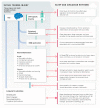The Putative Role of Neuroinflammation in the Interaction between Traumatic Brain Injuries, Sleep, Pain and Other Neuropsychiatric Outcomes: A State-of-the-Art Review
- PMID: 36902580
- PMCID: PMC10002551
- DOI: 10.3390/jcm12051793
The Putative Role of Neuroinflammation in the Interaction between Traumatic Brain Injuries, Sleep, Pain and Other Neuropsychiatric Outcomes: A State-of-the-Art Review
Abstract
Sleep disturbances are widely prevalent following a traumatic brain injury (TBI) and have the potential to contribute to numerous post-traumatic physiological, psychological, and cognitive difficulties developing chronically, including chronic pain. An important pathophysiological mechanism involved in the recovery of TBI is neuroinflammation, which leads to many downstream consequences. While neuroinflammation is a process that can be both beneficial and detrimental to individuals' recovery after sustaining a TBI, recent evidence suggests that neuroinflammation may worsen outcomes in traumatically injured patients, as well as exacerbate the deleterious consequences of sleep disturbances. Additionally, a bidirectional relationship between neuroinflammation and sleep has been described, where neuroinflammation plays a role in sleep regulation and, in turn, poor sleep promotes neuroinflammation. Given the complexity of this interplay, this review aims to clarify the role of neuroinflammation in the relationship between sleep and TBI, with an emphasis on long-term outcomes such as pain, mood disorders, cognitive dysfunctions, and elevated risk of Alzheimer's disease and dementia. In addition, some management strategies and novel treatment targeting sleep and neuroinflammation will be discussed in order to establish an effective approach to mitigate long-term outcomes after TBI.
Keywords: Alzheimer’s; concussion; dementia; headache; microglia; neuroinflammation; pain; sleep; traumatic brain injury.
Conflict of interest statement
The authors declare no conflict of interest.
Figures

References
-
- Martins H.A.L., Martins B.B.M., Ribas V.R., Bernardino S.N., de Oliveira D.A., Silva L.C., Sougey E.B., Valenca M.M. Life quality, depression and anxiety symptoms in chronic post-traumatic headache after mild brain injury. Dement. Neuropsychol. 2012;6:53–58. doi: 10.1590/S1980-57642012DN06010009. - DOI - PMC - PubMed
Publication types
Grants and funding
LinkOut - more resources
Full Text Sources

